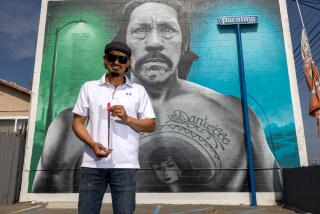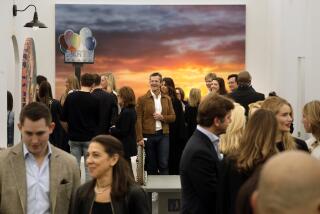Money talk for writers and other creatives with 90X90LA

In a city as inspiring — and expensive — as Los Angeles, how can artists preserve their creative integrity while maintaining the bottom line?
That was the subject discussed Tuesday night at the Annenberg Community Beach House, fittingly on the former site of a 100-room mansion built by the phenomenally wealthy William Randolph Hearst.
Presented as one of the Annenberg’s free “Beach=Culture” events, it was the one-month mark for 90X90LA, a series of 90 arts, culture and literary events presented over 90 consecutive days by Writ Large Press and their collaborators.
In a room flanked with floor-to-ceiling windows looking onto the Santa Monica coast, the event bypassed polite conversation for real talk. Roughly a dozen people showed up, made all the more casual by gray leather bean bags on which a few audience members lounged.
“I definitely didn’t get into books to be rich,” said Kima Jones, founder of book publicity company Jack Jones Literary Arts.
The panelists represented diverse artistic pursuits — books, film, visual arts, community building — and various perspectives on the intersection of art and commerce.
90X90LA organizer Chiwan Choi served as moderator. In addition to Jones, the panelists included Adam Leipzig, chief executive of Entertainment Media Partners and a film producer; Sarah R. Filley, CEO and cofounder of Popuphood, which connects “building owners and cities with local business incubation programs;” and Skira Martinez, owner of Cielo galleries/studios, another presenter of 90X90LA.
Though riches may not be the endgame for Jones, who was recently profiled on Refinery29 and whose client Tyehimba Jess received the 2017 Pulitzer Prize for poetry, running a successful business is tantamount.
She spoke of tailoring campaigns to the unique circumstances of each writer, talking nervous debuts “off the ledge,” and encouraging authors to promote themselves.
“I don’t care about introverts — oh God, spare me,” she said of reclusive writers reluctant to engage on the web. “I didn’t want to cross La Brea,” she said, alluding to L.A.’s East-West commuter divide, but “I’m here. It’s my job.” Similarly, authors should weigh preciousness against their goals. “I’m not sending books out to like, ‘war crimes magazine,’” she said, but “if a writer doesn’t want a piece in Playboy” and Jones is looking at their distribution line, “too bad.”
Leipzig, who recently released the documentary “A Plastic Ocean,” picked up that thread, adding that filmmakers also do well to refine their priorities. Do they want to make money, have their film seen or win awards at festivals? One outcome (in rare cases two) is possible, but never all. “The scant resource in this world” for any artistic endeavor, he said, “is the audience’s eyeballs.” With film, as opposed to, say, writing poetry, “the biggest difference is the collaborators you have to have.”
Filley’s work with Popuphood, which launched in Oakland, also involves collaboration, albeit on another scale. By studying “cluster economics” and “constellation mapping” of neighborhoods (for example a block with six empty retail spaces) she can funnel developer money into necessary businesses, “utilizing community leaders who are already doing hard work.” When an audience member asked how to prolong the short shelf-life of so many burgeoning arts and culture spaces, Filley’s advice for sustainability was practical. Get a long lease on a building — don’t balk at five years — and buy property if you can. When those aren’t options, there are “scrappier” opportunities, like sharing a space, something Martinez of Cielo, which is both a gallery and studios, understood well.
Among the panel, Martinez’s experience was unique. She does not use credit cards and has lived without a bank account for the 11 years, paying for everything, including her rent, in cash. Other necessities, like soap and food, are gained through a barter economy — she is strongly invested in the gallery’s community in historic South Central L.A. — and otherwise subsists on about $60 per month.
“It’s challenging not to have pocket change,” she said, smiling, “but I find it easier and easier every year.”
Choi, a poet, closed with a question that has begun to feel increasingly relevant as artists brands themselves as “creatives” and think pieces roll out on the “creative class”: Should artists consider themselves entrepreneurs?
The verdict was roughly three to one.
Jones answered with an emphatic yes, encouraging writers to demand payment for their work and take responsibility for acquiring basic business acumen. By way of example, she described calculating the price of a Lyft to the panel, to be certain her honorarium covered it. “You own your business,” she said. “The business of you.”
Leipzig echoed. “No one is ever going to be an entrepreneur for you,” he said. “We artists don’t demand value for our work … we end up becoming the greatest obstacle to ourselves.”
Filley agreed, contextualizing the artist as entrepreneur on a civic level. “There are tangible economic benefits for the arts,” she said. “What is the economic return on a poetry center?” she asked, looking around the Annenberg. “Or this place on the beach?”
Only one panelist hesitated. Should artists consider themselves entrepreneurs? “Some artists,” Martinez said.
As for alternate financial systems and anti-capitalism, “that’s great — down with the man,” Jones said, sharing a different view, “but we have to feed our families.”
More to Read
Sign up for our Book Club newsletter
Get the latest news, events and more from the Los Angeles Times Book Club, and help us get L.A. reading and talking.
You may occasionally receive promotional content from the Los Angeles Times.







